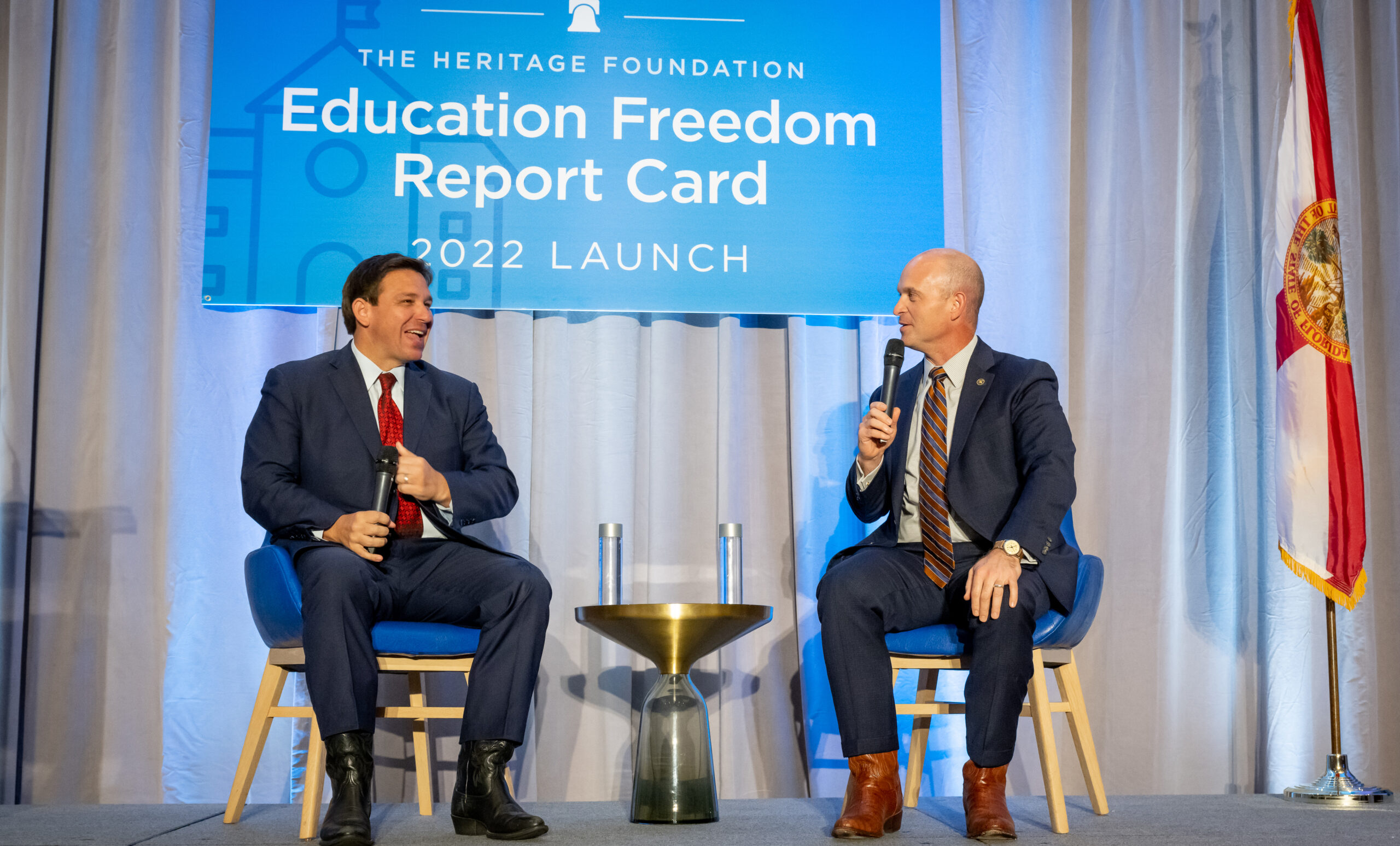Touting Education Record, DeSantis Outlines Agenda for Beating the ‘Elites’
In a new education report card, Florida ranks first on issues conservatives think can help them beat Democrats in midterms

Get stories like this delivered straight to your inbox. Sign up for The 74 Newsletter
With Republicans hoping to take the House in November, Florida Gov. Ron DeSantis is offering conservative candidates a roadmap for battling Democrats on education.
At a Friday event hosted by the right-leaning Heritage Foundation, DeSantis pointed to recent dismal national test scores as vindication for his decision to fully reopen schools in the fall of 2020. He touted his parental rights agenda and defended his opposition to mask mandates and quarantines for children who weren’t sick.
“The way different places handled COVID is going to reverberate in terms of the educational outcomes for these kids for quite some time,” he said. “We got the big issues right. Unfortunately, a lot of places around the country got the big issues wrong.”
The event coincided with the release of a new Education Freedom Report Card, which ranks Florida as first in the nation for school choice, transparency on education and the extent to which it keeps “overburdensome” regulations to a minimum. But as with recent appearances in Pennsylvania and Arizona, the events also offered an opportunity to position DeSantis, who is running for reelection against Democrat Charlie Crist, as a potential national candidate.
“You can stand for regular people, and we can beat these elites,” he said, acknowledging the “blowback” he faced from teachers unions for requiring schools to be open five days a week. “I’ll take the arrows. That’s what a leader does.”
In the latest state polls, DeSantis has at least a 5 percentage point lead over Crist. Critics say his policies defy Republicans’ preference for local control, and he’s facing a federal lawsuit over a new law that limits what teachers and college professors can say about race and gender in the classroom.
DeSantis-backed school board candidates picked up seats across Florida in last month’s primary. But Corey DeAngelis, a speaker at the event and a senior fellow at the conservative American Federation for Children, said the anti-union message resonates beyond Florida.
He pointed to the defeat of nine out of 10 Tennessee House candidates in the Republican primary who were backed by the Tennessee Education Association.
“Coming out against parental rights in education is becoming a form of political suicide,” he said, citing Democrat Terry McAuliffe’s statement in last year’s Virginia governor’s race that he didn’t think “parents should be telling schools what to teach.” Many observers link that comment to his defeat by Republican Glenn Youngkin.
‘Political games’
McAuliffe drew criticism during that campaign for having American Federation of Teachers President Randi Weingarten join him at a rally. But that hasn’t stopped some Democratic candidates from giving the teachers unions even more visibility this year.
In Florida, Crist chose United Teachers of Dade President Karla Hernández-Mats as his running mate. And in Pennsylvania, Lt. Gov. John Fetterman, in a tight race against Republican Dr. Mehmet Oz for a Senate seat, said if he wins, his first call would be to the teachers unions.
Democrats are divided over whether President Joe Biden’s student debt forgiveness plan could lift their chances at the polls in November. But some, like Nevada incumbent Sen. Catherine Cortez Masto, running against Republican Adam Laxalt, have campaigned on passage of the American Rescue Plan, which included $122 billion for K-12.
Heather Harding, executive director of the Campaign for Our Shared Future, is among those trying to redirect the conversation on education away from culture wars. Funded by organizations that support Democrats, the nonprofit is organizing parents and educators to counter conservative activist groups like Moms for Liberty.
“Many politicians across the country are manufacturing controversies and outrage for their own personal gain,” Harding said in an email, without naming DeSantis specifically. “Their political games are hurting our children’s education and futures.”
The left-leaning Network for Public Education issued its own report card earlier this year, ranking states on their “resistance to the privatization of public education.” Nebraska and North Dakota, which have neither voucher programs nor charter school laws, both received an A+.
By contrast, the Heritage Foundation’s new tool measures education policies that matter most to conservatives. States received more points if they support alternative teacher licensing programs and dropped Common Core standards. They ranked lower, however, if they have a lot of districts with diversity officers, which according to their experts, “provide political support and organization to one side of the debate over the contentious issues of race and opportunity.”
The report card builds on earlier efforts — from groups like EdChoice and the conservative Center for Education Reform — to identify states with more choice-friendly features at a time when the movement to give families more options has picked up momentum.
Arizona, which came in second in the report card, recently opened up its voucher program to any family. Proponents of expanded choice want to see public education funds “follow the child” into whatever school, public or private, the parent chooses.
“If you like your public school, you can keep your public school,” DeAngelis said, offering a twist on the motto former President Barack Obama used to promote the Affordable Care Act. “I think we’re going to look back in a couple of decades … and think it was just absolutely ridiculous that we forced families to take their kids’ education dollars to residentially assigned government-run institutions.”
Get stories like these delivered straight to your inbox. Sign up for The 74 Newsletter

;)
